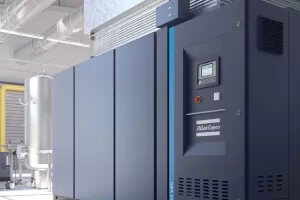Applications
Compressors are used across many industries to provide pressurized air, power air tools, operate paint sprayers, and support abrasive blast equipment. They are also crucial in refrigeration, air conditioning, and gas transportation, and are commonly found in laboratory environments. In the oil and gas sector, compressors are used to compress natural gas for storage and transport.
Sizes & Types
Compressors come in various sizes, from small units that inflate car tires to massive machines used in oil pipelines. Our compressors are categorized into two main types: positive-displacement compressors, which include reciprocating and rotary styles.
Common Compressor Types:
- Piston Compressors
- Diaphragm Compressors
- Helical Screw Compressors
- Sliding Vane Compressors
- Scroll Compressors
- Rotary Lobe Compressors
- Centrifugal Compressors
- Axial Compressors
1. Piston Compressors
Piston compressors work by compressing gas and transferring it to a tank. These compressors are widely used in plant-air systems, which operate within the 90-110 psi range. Depending on the application, a single unit or multiple smaller units can be deployed.
2. Diaphragm Compressors
These compressors use a flexible diaphragm that moves in a reciprocating cycle, expanding and contracting the compression chamber. Diaphragm compressors are ideal for applications requiring clean air, such as medical and laboratory settings, as they are designed for lower capacities.
3. Helical Screw Compressors
Helical screw compressors are rotary machines that run continuously (100% duty cycle). They use meshing male and female rotors to compress gas. These compressors are quieter than piston compressors and can be either oil- or water-lubricated, or designed for oil-free operation.
4. Sliding Vane Compressors
Sliding vane compressors feature vanes mounted on a rotor that sweeps the inside of an eccentric cavity, reducing the volume and compressing gas. These compressors are reliable, can operate at full capacity, and are commonly used in industries such as oil and gas.
5. Scroll Compressors
Scroll compressors have an oil-free design where one spiral moves while the other remains stationary, changing the space between them to compress air. These compressors are typically used in air conditioning systems due to their ability to handle moderate pressures.
6. Rotary Lobe Compressors
Rotary-lobe compressors are ideal for high-volume, low-pressure applications. They are used in industries where large amounts of air are required at lower pressures.
7. Centrifugal Compressors
Centrifugal compressors work by throwing gas outward to increase pressure. These are typically used in large-scale industrial processing or refrigeration applications.
8. Axial Compressors
Axial compressors are designed for high-volume airflow, making them ideal for jet engines. They feature multi-stage designs that allow them to effectively manage low compression ratios.
Power & Fuel Options
Our air compressors are available with various power options, including electrically powered models, such as 12V DC and 24V DC compressors. Electric compressors are beneficial in environments where the use of combustible fuels is not ideal, as they eliminate exhaust fumes.
Oil vs. Oil-Free Compressors
Oil Compressors: Oil compressors use oil for heat removal, lubrication, and sealing. Oil is applied to bearings and sidewalls to reduce wear and prevent air leaks.
Oil-Free Compressors: Oil-free compressors use self-lubricating materials and specialized piston designs to eliminate the need for oil in their operation. These compressors are particularly beneficial in industries where clean air is critical, and the risk of oil contamination must be minimized.
Air Quality
The quality of air produced by a compressor can vary depending on the intake conditions. For many applications, higher moisture levels in the air may not impact performance. However, for sensitive operations, it is important to ensure the compressed air meets specific purity standards.
Performance Specifications
When selecting a compressor, consider the following key parameters:
- Volumetric capacity
- Pressure capability
- Power requirements
Additional factors to keep in mind:
- Oil vs. oil-free design
- Compressor size and footprint
- Air quality and filtration sensitivity
- Control options and additional features
Order Now
At RAAH Projects, we provide comprehensive compressed air solutions, including air treatment products and custom compressor systems tailored to your needs. Contact us today to place your order or for more information on how we can support your specific requirements.

